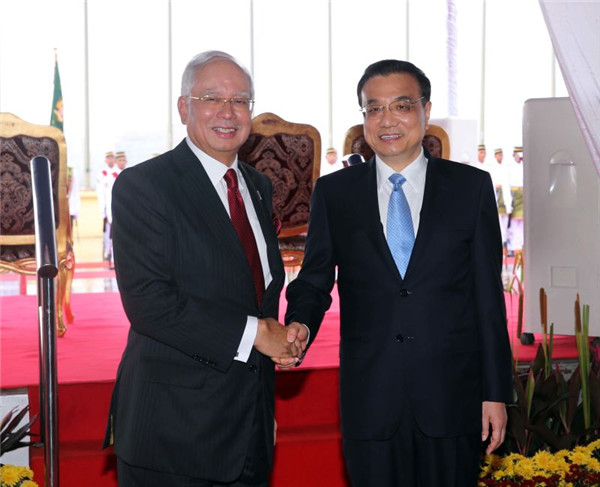 |
|
Chinese Premier Li Keqiang (R) shakes hands with Malaysian Prime Minister Najib Razak during their talks in Kuala Lumpur, Malaysia, Nov 23, 2015. [Photo/Xinhua] |
Chinese Premier Li Keqiang was recently in Malaysia to address the 18th ASEAN-China summit in Kuala Lumpur on Nov 21, 2015.
Malaysian Prime Minister Najib Razak held a grand welcome ceremony in the Malaysian capital for Premier Li Keqiang, who is on his first trip to Malaysia since taking office in 2013.
It can be safely said that ASEAN warmly welcomes China's extended partnership, as can be attested by the red carpet treatment given by the heads of state for Premier Li. China has stepped up efforts to sell its ambitious One Belt and One Road initiative, which aims to create multiple economic corridors spanning more than 60 countries across the world. ASEAN diplomats opined that China's 21st Century Maritime Silk Road initiative can help to spur economic development in the region, and transform ASEAN into a single market and production base in order to boost the region's competitiveness and connectivity globally.
Improving the quality of education is a common challenge faced by ASEAN nations where shortage of quality teachers, insufficient funding by their respective governments and lack of a robust holistic curriculums plague the ASEAN countries. Education alleviates poverty and propels third world and developing nations to a world-class developed nation status. Yet, there seems to be a disconnect between academia and the corporate world, media and government. A cohesive Parent Teacher Association which each education provider should champion seems to be disintegrating as both parents and teachers become disillusioned with the current state of the education system.
"The pen is mightier than the sword."
This is a common adage held by both the Western and Eastern spheres, yet there is an ongoing debate on which method is superior.
In my opinion, as a beneficiary of both the British and Chinese education systems, there is no superior curriculum. What academia should focus on is to really understand the strengths within China and ASEAN's education systems. China lauds itself on its centuries'old academic foundation based on Confucianism and Taoism. ASEAN's education system is largely influenced by their former colonial masters, being British and to some extent European and even American.
We are living in a globalized world, where cultures blend seamlessly and multicultural inclusiveness is on every country's national agenda. Let us not divide, but unite according to our own individual strengths and uniqueness in creating a truly globalized education system relevant in this 21st century.
The year 2016 will see the birth of a new ASEAN as a collective region. Chinese Premier Li's recent visit to this region forges a new sense of unity amongst its Asian members as the Motherland lends her support in the form of funding, transfer of knowledge and sharing best practices from her centuries old Confucian and Sun Tzu teachings.
The Year of the Red Fire Monkey will prove to be an interesting one, where the ASEAN Tigresses unite as one and China pledges her unwavering support.